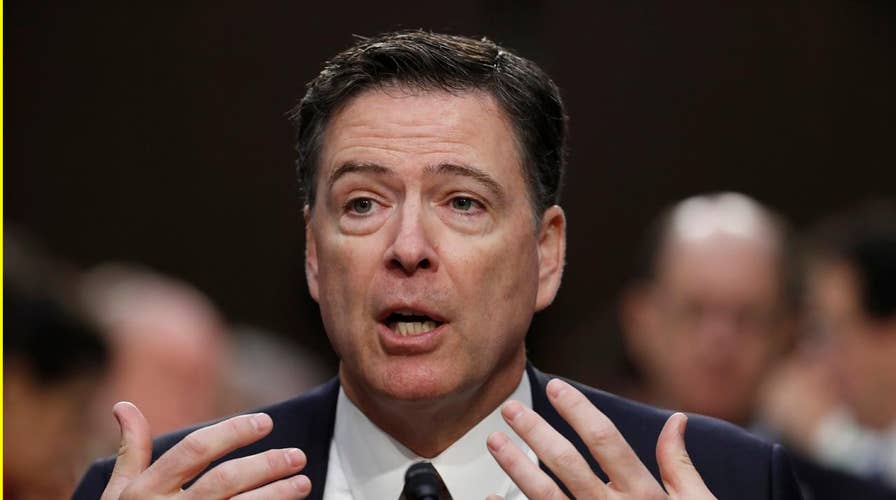Sources claim Comey memos contained classified material
President Trump tweets the former FBI director acted illegally; chief intelligence correspondent Catherine Herridge reports from Washington
Hillary Clinton, thanks to James Comey, escaped criminal prosecution for violating the Espionage Act.
Now it is Comey who may have violated that same law. If he did, will Comey escape prosecution, courtesy of his good friend, Robert Mueller?
The fired FBI Director’s legal predicament comes as The Hill reports that Comey authored seven memorandums reflecting the contents of his conversations with President Trump and that four of the memos “have been determined to contain classified information.”
If this is true and Comey kept these documents in his personal possession upon leaving government service and conveyed some of them to another individual without authorization, then it would appear that he committed multiple felonies under the Espionage Act.
It is a crime to mishandle classified information: 18 USC 798 and 1924 prohibit a government official from removing a classified document from its proper place of custody to a location which is unsecure and disclosing it to an unauthorized person. Is this what Comey did? It sure looks like it.
How can Mueller discharge his responsibilities in a fair, objective and impartial manner? Will the mentor investigate and, if warranted, prosecute his protégé? Doubtful.
Hillary Clinton, as Secretary of State, stored 110 emails containing classified information on her home computer server, an unauthorized place. Yet, Comey misinterpreted the criminal statute by claiming she did not “intend to violate the law.” This is not the legal standard, as any knowledgeable lawyer will tell you. Clinton was never indicted, though she should have been.
David Petraeus, former Director of the CIA, was not so fortunate. He pled guilty to removing classified documents to his personal residence where he stored them in an unsecured drawer. He also gave them to his biographer who was not authorized to receive them.
John Deutch, also a former CIA Director, agreed to plead guilty to keeping classified material on his unauthorized laptop computer, but was pardoned by President Bill Clinton just days before the formal charges were filed.
Comey insists the information contained in the memo he gave to his lawyer friend who leaked it to the media was unclassified. If true, it is not a violation of the Espionage Act. But if Comey gave his friend, Columbia University Professor Daniel C. Richman, any of the four documents containing classified information, then he committed one or more crimes.
Richman now claims he received four memos from Comey, but none were marked classified. The good professor may not realize that the “marking” in no way determines its classified status. The content dictates classification, as Fox News Chief Intelligence Correspondent Catherine Herridge has consistently pointed out.
Importantly, if Comey maintained these four documents in his personal possession, as his Senate testimony suggests, then he may have committed at least four more crimes in the same way that Clinton, Petraeus and Deutch did. Again, it is a felony to keep documents containing classified information in an unauthorized place, such as your personal possession, home or private unsecured computer.
As explained in an earlier column, Comey likely violated another law. All of his memos are, unquestionably, government property under the Federal Records Act and the FBI’s own Records Management regulations. They were composed by him in the course and scope of his employment as the Director of the FBI. In meeting with President Trump, Comey was not acting as a private citizen. Both Congress and the FBI agree on this obvious point.
Therefore, the memos were not Comey’s to keep in his possession. It is a crime to convert government property to your own personal use and then give it to another person. 18 USC 641 makes it a felony to “steal, sell or convey” such property to someone else without permission.
Comey’s conduct and whether it constitutes numerous crimes should be investigated by Special Counsel, Robert Mueller. Yet, that is not likely to happen. Why?
In a previous column, I described in detail how Mueller and Comey have been long-time close friends, allies and partners. They have enjoyed a mentor-protégé relationship.
This is precisely why Mueller should have disqualified himself from serving under the special counsel statute (28 CFR 600.7 and 28 CFR 45.2). His strong relationship to Comey creates a genuine conflict of interest and, at the very least, the appearance of impropriety.
How can Mueller discharge his responsibilities in a fair, objective and impartial manner? Will the mentor investigate and, if warranted, prosecute his protégé? Doubtful.
The prospect of prejudice and favoritism this case presents is anathema to the fair administration of justice.
The American people expect and deserve something better than a legal charade.









































